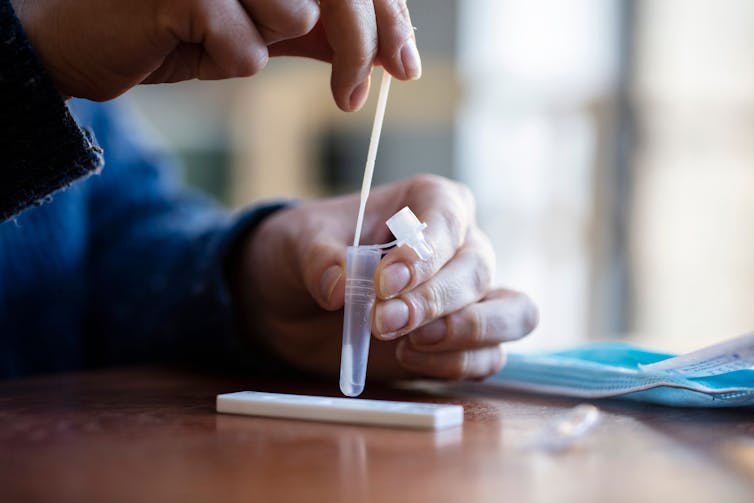
How long does immunity last after a COVID infection?
Nearly four years into the pandemic, Australia, like many other countries, is still seeing large numbers of COVID cases. Some 860,221 infections were recorded around the country in 2023, while 30,283 cases have already been reported in 2024.
This is likely to be a significant underestimate, with fewer people testing and reporting than earlier in the pandemic. But the signs suggest parts of Australia are experiencing yet another COVID surge.
While some lucky people claim to have never had COVID, many are facing our second, third or even fourth infection, often despite having been vaccinated. You might be wondering, how long does immunity last after a previous infection or vaccination?
Let’s take a look at what the evidence shows.
B cells and T cells
To answer this question, we need to understand a bit about how immunity to SARS-CoV-2 (the virus that causes COVID) works.
After being infected or vaccinated, the immune system develops specific antibodies that can neutralise SARS-CoV-2. B cells remember the virus for a period of time. In addition, the immune system produces memory T cells that can kill the virus, and remain in the blood for some months after the clearance of the infection or a vaccination.
A 2021 study found 98% of people had antibodies against SARS-CoV-2’s spike protein (a protein on the surface of the virus that allows it to attach to our cells) one month after symptom onset. Six to eight months afterwards, 90% of participants still had these neutralising antibodies in their blood.
This means the immune system should have recognised and neutralised the same SARS-CoV-2 variant if challenged within six to eight months (if an infection occurred, it should have resulted in mild to no symptoms).
But what about when the virus mutates?
As we know, SARS-CoV-2 has mutated over time, leading to the emergence of new variants such as alpha, beta, delta and omicron. Each of these variants carries mutations that are new to the immune system, even if the person has been previously infected with an earlier variant.
A new variant likely won’t be perfectly recognised – or even recognised at all – by the already activated memory T or B cells from a previous SARS-CoV-2 infection. This could explain why people can be so readily reinfected with COVID.

A recent review of studies published up to the end of September 2022 looked at the protection conferred by previous SARS-CoV-2 infections.
The authors found a previous infection provided protective immunity against reinfection with the ancestral, alpha, beta and delta variants of 85.2% at four weeks. Protection against reinfection with these variants remained high (78.6%) at 40 weeks, or just over nine months, after the previous infection. This protection decreased to 55.5% at 80 weeks (18 months), but the authors noted there was a lack of data at this time point.
Notably, an earlier infection provided only 36.1% protection against a reinfection with omicron BA.1 at 40 weeks. Omicron has been described as an immune escape variant.
A prior infection showed a high level of protection against severe disease (above 88%) up to 40 weeks regardless of the variant a person was reinfected with.
What about immunity after vaccination?
So far almost 70 million COVID vaccines have been administered to more than 22 million people in Australia. Scientists estimated COVID vaccines prevented around 14.4 million deaths in 185 countries in the first year after they became available.
But we know COVID vaccine effectiveness wanes over time. A 2023 review found the original vaccines were 79.6% and 49.7% effective at protecting against symptomatic delta infection at one and nine months after vaccination respectively. They were 60.4% and 13.3% effective against symptomatic omicron at the same time points.
This is where booster doses come into the picture. They’re important to keep the immune system ready to fight off the virus, particularly for those who are more vulnerable to the effects of a COVID infection.
Plus, regular booster doses can provide immunity against different variants. COVID vaccines are constantly being reviewed and updated to ensure optimal protection against current circulating strains, with the latest shot available designed to target the omicron variant XBB 1.5. This is similar to how we approach seasonal flu vaccines.
A recent study showed a COVID vaccination provides longer protection against reinfection than natural protection alone. The median time from infection to reinfection in non-vaccinated people was only six months, compared with 14 months in people who had received one, two or three doses of vaccine after their first infection. This is called hybrid immunity, and other research has similarly found it provides better protection than natural infection alone.
It also seems timing is important, as receiving a vaccine too soon after an infection (less than six months) appears to be less effective than getting vaccinated later.
What now?
Everyone’s immune system is slightly unique, and SARS-CoV-2 continues to mutate, so knowing exactly how long COVID immunity lasts is complicated.
Evidence suggests immunity following infection should generally last six months in healthy adults, and can be prolonged with vaccination. But there are exceptions, and all of this assumes the virus has not mutated so much that it “escapes” our immune response.
While many people feel the COVID pandemic is over, it’s important we don’t forget the lessons we have learned. Practices such as wearing a mask and staying home when unwell can reduce the spread of many viruses, not only COVID.
Vaccination is not mandatory, but for older adults eligible for a booster under the current guidelines, it’s a very good idea.
Disclosure statement
Lara Herrero receives funding from NHMRC.
Wesley Freppel does not work for, consult, own shares in or receive funding from any company or organisation that would benefit from this article, and has disclosed no relevant affiliations beyond their academic appointment.
This article is republished from The Conversation under a Creative Commons license. Read the original article, published on 23 January 2024.


